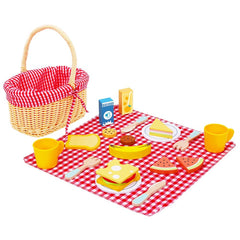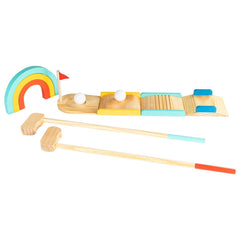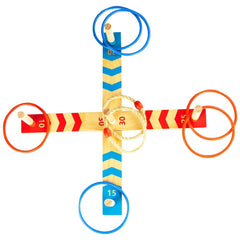Beginning preschool is a significant event for parents as well as for kids. Starting a preschool journey is both exhilarating and emotional. Even if your child is ready, you may be wondering how to choose a preschool and how to say sweet school goodbye to your little ones. Rest assured that we will help you prepare for this new adventure.
What is a preschool?
Usually for kids between 2 and 5 years, preschool is the initial step into formal learning. Consider it as a link between formal and home-based learning. It blends learning with real-life experiences and play sessions to learn new skills. From colouring to DIY activities, preschool provides an opportunity for these young children to explore writing, drawing, and expressing themselves.
This also helps children learn numbers and alphabets. Preschools help to nurture colour and shape recognition in children by engaging them in various games and activities like the geometric shape sorters or the wooden abacus for kids.
When in the UK do children typically begin their preschool journey?
Usually children in the UK join preschool or nursery between 2 and 3 years of age. To help you decide if your child is ready for this new leap, ensure they have exposure to some basic activities, like sorting and colouring, so that not everything is absolutely new for them. Usually preschools start when the children turn three years old, so keep that in mind while enrolling your child in a nursery.
Guide on Getting Your Child Ready for Preschool
1. Talk About It—A Lot
Initiate an early conversation regarding preschool. Mention it in casual talks: "You're going to make many friends!" Or "There'll be storytime and painting!" Day one will go more easily the more familiar it seems.
2. Travel Together
Many preschoolers feature open days or stay-and-play events. Bring your child along to view the area, meet the teachers, and investigate the toys. It will help to make the place less alien, and children can quickly gel up with their surroundings.
3. Separate Practices
Start with little goodbyes if your little ones haven't spent much time apart from you. You can arrange short playdates away from you or leave them with a reliable family member. This increases their independence confidence.
4. Build a Routine
School mornings can be hectic. Beforehand, work on a morning ritual including getting ready, eating breakfast, and leaving the house at a scheduled time. Routines let kids know what to expect and feel protected.
5. Inspire Independence
Let your youngster work on basic chores such as handwashing and toy cleaning. These little abilities really enable students to be confident in a group environment.
Games and toys to prepare for school
One of the best ways to equip kids for preschool is play. Some toys and games can help acquire important abilities, such as fine motor coordination, patience, problem-solving, and even sharing. Here are some examples:
1. Games of Puzzle
Perfect for developing fine motor abilities, spatial awareness, and focus, the wooden puzzles are the perfect companion for a preschooler. They also impart a sense of accomplishment and patience in children while helping them learn important skills.
2. Activity Boards
Excellent for developing fine motor abilities are busy boards, sometimes known as activity boards. Buttons, zippers, switches, and latches give young fingers lots of practice for jobs they'll accomplish at preschool—think putting on shoes or zipping up a coat.
3. Role-Play Objects
Children can role-play real-life events in pretend play kitchens, doctor sets, or grocery stores. This stimulates not just the creativity but also social skills, including sharing turns and group projects.
4. Stacking Toys & Shape Sorters
For hand-eye coordination and problem-solving, simple games like stacking games or shape sorters are perfect. They also provide a covert means of introducing shapes, colours, and sizes.
Quick tips for parents
For parents, too, starting preschool marks a significant adjustment. These few brief pointers should help you get through it:
- Your youngster picks emotional cues from you; stay positive. Try to keep positive even if you are nervous. Occasionally a wonderful smile and a confident farewell as they prepare for a fresh journey is all it takes to make something memorable.
- A unique handshake, hug, or phrase like "See you later, Alligator!" can help ease the nervousness and make your children feel at ease with the newness.
- If you find yourself in an emotional loop, then grab a coffee, inhale deeply, and remind yourself that each day is a fantastic journey for your child.
- School staff members are usually eager to talk about how things are doing and are excellent at calming kids down. Should you be worried, don't hesitate to reach out to them and voice your opinions.
Wrapping Up!
For your child as well as you, school marks the beginning of a wonderful journey. Indeed, there may be some shaky mornings; however, with some planning, patience, and a lot of love, it can be a wonderful experience.
However, each child develops at their pace. While some will go in without a thought, others want time and more comfort. And that's alright. One small step at a time, we hope to enable children to feel comfortable, confident, and ready to explore the planet.
You have this, as does your little star!
We hope that the guide above gave you useful insights and will help you find the next best toy for your kids while they prepare for their preschool. Explore our entire collection of toys at Barnshenn for newborns and toddlers. Are you in search of additional inspiration? Hop on to our social media handles, like TikTok, Pinterest, and Instagram, for more gift inspiration for toddlers. See you in the next blog.





